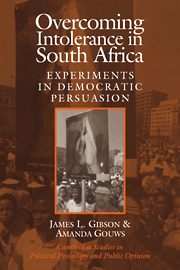Book contents
- Frontmatter
- Contents
- List of Tables and Figures
- Preface
- Part I Introduction
- Part II South African Intolerance as It Is
- Part III South African Tolerance as It Might Be
- 6 The Persuasibility of Tolerance and Intolerance
- 7 The Law and Legal Institutions as Agents of Persuasion
- 8 Becoming Tolerant? Short-Term Changes in South African Political Culture
- 9 Conclusions: Experimenting with Tolerance in the New South Africa
- Appendix A Research Design and Methodology
- References
- Index
- Books in the series
9 - Conclusions: Experimenting with Tolerance in the New South Africa
Published online by Cambridge University Press: 22 October 2009
- Frontmatter
- Contents
- List of Tables and Figures
- Preface
- Part I Introduction
- Part II South African Intolerance as It Is
- Part III South African Tolerance as It Might Be
- 6 The Persuasibility of Tolerance and Intolerance
- 7 The Law and Legal Institutions as Agents of Persuasion
- 8 Becoming Tolerant? Short-Term Changes in South African Political Culture
- 9 Conclusions: Experimenting with Tolerance in the New South Africa
- Appendix A Research Design and Methodology
- References
- Index
- Books in the series
Summary
We entitled this chapter “Experimenting with Tolerance” as a means of calling attention both to South Africa's experiment with political tolerance at the societal level, as well as to our experiments at the individual level with manipulating attitudes and preferences. This double entendre reflects our interest in both the macro- and micropolitics of South Africa. Thus, in this final chapter, we draw conclusions about both aspects of the South African experiment.
EXPERIMENTS IN CREATING TOLERANT SOUTH AFRICANS
Our analysis has been concerned with both the nature of South African political culture and its possibilities for change – what it is, and what it might become. Consequently, the first portion of this book was devoted to a careful examination of the structure of South African intolerance, based on an unusually powerful, randomly selected sample of three thousand ordinary people. We discovered that political intolerance is fairly widespread in South Africa – although not as common as it is in Russia – and that South African intolerance has many pernicious characteristics. For instance, intolerance is not relegated to the fringes of the active political spectrum in South Africa, but is instead centered on one of the country's major political parties. Nor is intolerance dispersed “pluralistically” one of the innovations of the methodology we employ here is that it allows us to determine whether in fact majorities form around one or more unpopular political minorities. Our conclusions from this portion of our analysis are discouraging for those who favor open political competition among all political ideas.
- Type
- Chapter
- Information
- Overcoming Intolerance in South AfricaExperiments in Democratic Persuasion, pp. 212 - 222Publisher: Cambridge University PressPrint publication year: 2002



